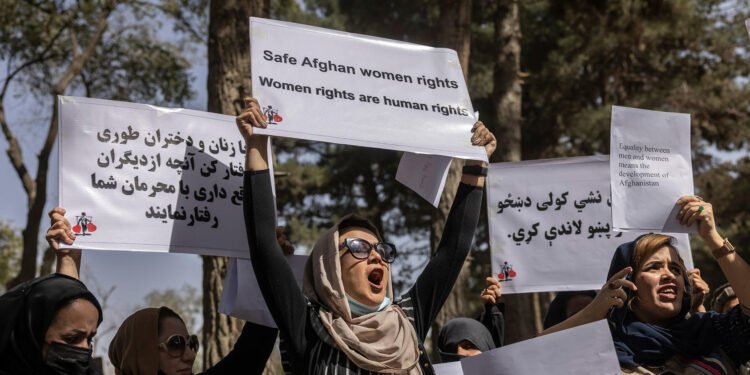Belgium (Brussels Morning Newspaper), European Parliament Adopts Resolutions Addressing Human Rights Crisis in Afghanistan, the resolution was adopted by 513 votes in favor, 9 against, and 24 abstentions.
On Thursday, the European Parliament took a decisive step in addressing the concerning human rights situation in Afghanistan by adopting two resolutions. The resolutions highlight the pervasive repression and grave violations of human rights, particularly targeting women, ethnic and religious minorities, and LGBTIQ+ individuals.
MEPs expressed deep concern over the humanitarian and human rights crisis in Afghanistan, emphasizing the dismantling of the judicial system by the Taliban. The Taliban’s imposition of Sharia law and their systematic exclusion of women and girls from public life amount to gender persecution and gender apartheid, as stated by the Parliament. They urgently call upon the Taliban to restore the full and equal participation of women and girls in society, including access to education and employment.
The Parliament further urges the de-facto Afghan authorities to abolish capital punishment immediately and cease all public executions. Additionally, they condemn the barbarous persecution and discriminatory policies targeting women, LGBTIQ+ individuals, as well as ethnic and religious minorities.
In terms of engagement with the Taliban, MEPs underscore that any interaction by the EU must be subject to strict conditions established by the Council and aligned with recommendations from the UN Special Rapporteur.
The European Parliament stands in solidarity with Afghan civil society’s demand for accountability for the crimes committed by the de facto authorities. They support the establishment of a UN Independent Investigative Mechanism and call for expanding EU restrictive measures to hold perpetrators accountable.
In summary, the European Parliament’s resolutions reflect a firm commitment to addressing the ongoing human rights crisis in Afghanistan and advocating for the protection of the rights and dignity of all Afghan citizens, particularly those most vulnerable to persecution and discrimination.
In a statement in Geneva on February 29, 2024, a UN expert expressed grave concern over the deteriorating human rights situation in Afghanistan, highlighting the unacceptable suffering endured by its people. Richard Bennett, the UN Special Rapporteur on the situation of human rights in Afghanistan, emphasized the urgent need for action from both the Taliban and the international community to halt this downward spiral and provide hope for Afghans.
He pointed out the erasure of women and girls from public life, the suppression of peaceful dissent, and the rampant use of violence to instill fear with impunity. Bennett also underscored the compounding effect of an economic and humanitarian crisis, leading to the denial of economic, social, and cultural rights for many Afghans.
In his report submitted to the Human Rights Council, UN Special Rapporteur Richard Bennett delineated the escalating violations perpetrated by the Taliban against the rights of women and girls in Afghanistan. Bennett underscored the harsh imposition of the Taliban’s dress code as a significant component of these violations.
The report elucidated the alarming findings regarding the institutionalized, systematic, and widespread nature of gender-based discrimination in Afghanistan under Taliban rule. Bennett emphasized that these violations have reached unparalleled levels, constituting gender persecution and warranting the designation of “gender apartheid.”
Furthermore, Bennett announced his intention to delve deeper into this critical issue during the upcoming session of the Human Rights Council scheduled for June 2024. He aims to provide additional insights and recommendations to address the grave human rights situation faced by women and girls in Afghanistan.
In conclusion, the report serves as a crucial call to action for the international community to confront the Taliban’s egregious violations of women’s and girls’ rights in Afghanistan and to work towards ensuring the full protection and realization of their fundamental human rights.
Afghanistan is not the only country facing violence and human rights but the Venezuela is also the other country that the European Parliament also adopted a resolution on it.
The European Parliament has issued a strong condemnation of the Maduro regime in Venezuela, specifically targeting the imprisonment of numerous political prisoners under conditions that violate the United Nations standard minimum rules for their treatment.
Highlighting the urgency of the situation, Parliament demands the immediate and unconditional release of these political prisoners. It urges the Maduro regime to halt its repression and attacks on civil society and the opposition.
Moreover, MEPs call upon the European Union to escalate sanctions, extending them to encompass high-ranking officials, members of the security forces, members of the regime’s Supreme Tribunal of Justice, and President Maduro himself.
In a significant move, Parliament urges the International Criminal Court to expand its investigation to include ongoing human rights violations and arbitrary detentions perpetrated by the Maduro regime, as part of its probe into alleged crimes against humanity.
The report also emphasizes the importance of international support for the restoration of democracy in Venezuela, particularly in the context of upcoming elections. Notably, it advocates for the full participation of opposition leader María Corina Machado in these elections.
Additionally, MEPs call upon the Chilean authorities to conduct a thorough investigation into the murder of Ronald Ojeda, a former political prisoner who fled the Maduro regime. Simultaneously, they urge Venezuelan authorities to reinstate the Office of the High Commissioner for Human Rights and ensure their access to prisons.
In conclusion, the European Parliament’s report underscores the gravity of the situation in Venezuela and emphasizes the imperative of international action to address human rights abuses and support the restoration of democracy in the country. The resolution was adopted by 497 votes in favor, 22 against, and 27 abstentions.




